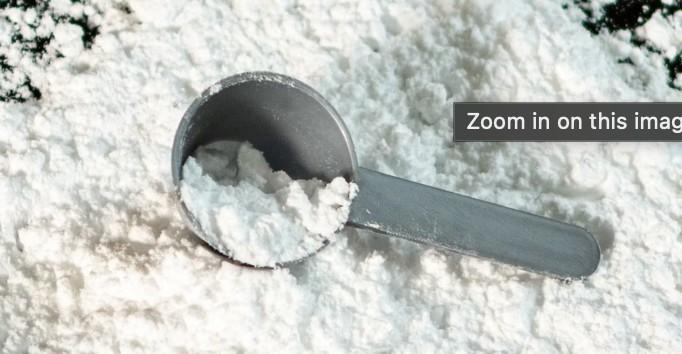Creatine is a popular supplement among athletes and fitness enthusiasts for its benefits in enhancing muscle mass, strength, and workout performance.
However, some individuals experience digestive issues, including diarrhea, when taking creatine.
If you’re one of those individuals wondering, “Why is creatine giving me diarrhea?” we will explore the reasons behind it, who should avoid taking creatine, and see how to mitigate these unwanted side effects.
What Is Creatine In A Hind Sight?
Creatine is a naturally occurring compound found in small amounts in certain foods and also produced by the human body. It’s stored in the muscles and used during high-intensity activities to produce energy.
Creatine supplements can significantly boost these energy reserves, but they can also cause gastrointestinal distress for some users.
Will Creatine Give You Diarrhea?
There is no one answer which fits all. Every one has a different body with their own nutrient profile.
While I myself didn’t face much of Diarrhea when taking creatine, but some of my friends did. Though it was okay within a few days, but yes they faced it.
Check : Can you take creatine on empty stomach?
Common Digestive Side Effects From Creatine
While creatine is generally safe for most people, some users report side effects such as:
- Diarrhea
- Bloating
- Stomach cramps
- Nausea
These side effects are typically mild but can be a bit problematic for some, especially for those who are not used to taking supplements.
Why Does Creatine Cause Diarrhea?
Creatine supplementation increases the water-holding capacity of body. It draws water into the intestines, which can lead to loose stools and increased bowel movements.
Additionally, high doses of creatine can stress the digestive system, further adding to the pressure on digestive system.
This is why creatine consumption leads to diarrhea when people take high doses of creatine supplement, or don’t take enough water.
Who Shouldn’t Take Creatine?
Creatine is not suitable for everyone. Certain individuals should avoid taking creatine, including those with:
- Kidney problems: Creatine is processed by the kidneys, and those with kidney issues should consult a healthcare provider before using it.
- Liver diseases: Similar to the kidneys, the liver is involved in metabolizing creatine.
- Diabetes: Creatine can affect blood sugar levels and insulin sensitivity.
Key Takeaway
People who have kidney issues, stones, diabetes, or health problems related to liver, they should not take creatine supplement.
How to Stop Diarrhea From Creatine?
If diarrhea is not going after a few days, you can try these fixes:
Start with a Lower Dose
One effective strategy to stop diarrhea is to start with a smaller dose of creatine and gradually increase it. This allows your digestive system to adapt to the supplement more easily.
Split Your Doses
Instead of taking a large dose of creatine all at once, try splitting it into smaller doses throughout the day. This can reduce the osmotic load on your intestines, minimizing the risk of diarrhea.
Choose the Right Form of Creatine
Different forms of creatine may have different effects on your digestive system.
Creatine monohydrate is the most researched and widely used form, but some people may find that creatine hydrochloride (HCl) or buffered creatine causes fewer digestive issues.
Take Creatine with Food
Taking creatine with meals can help reduce gastrointestinal pressure. Food can buffer the effects of creatine on the digestive tract and promote better absorption.
Stay Hydrated
Adequate hydration is crucial when taking creatine. Drinking enough water helps your body process the supplement more efficiently and can help with digestive side effects.
How Much Water Should I Drink When Taking Creatine?
Creatine supplementation increases the amount of water retained in your muscles.
So it becomes essential to stay properly hydrated and prevent dehydration, which can help avoid gastrointestinal issues like diarrhea.
Recommended Water Intake When Taking Creatine
A general guideline is to drink at least 8-10 glasses (2-2.5 liters) of water per day when taking creatine. However, individuals taking creatine supplement might need more, especially if they are engaging in intense exercise.
Aim for at least 3-4 liters of water daily to ensure optimal hydration.
Signs of Adequate Hydration
Monitor your hydration status by checking the color of your urine. Clear to light yellow urine typically indicates proper hydration, while dark yellow or amber urine suggests you need to drink more water.
Why Is My Stomach Upset After Taking Creatine?
Supplementing with creatine can upset stomach due to multiple reasons:
- High doses: Taking too much creatine at once can put pressure on your digestive system.
- Formulation: Some creatine supplements contain additives or fillers that may irritate your stomach.
- Timing: Taking creatine on an empty stomach can sometimes lead to gastrointestinal discomfort.
Tips to Prevent Stomach Upset From Creatine
- Start your creatine supplementation with a smaller dose and gradually increase it.
- Take creatine with or after a meal to reduce its effects on your stomach.
- Make sure you are taking pure creatine monohydrate without additives.
- Ensure you are drinking enough water to support proper digestion and absorption of creatine.
Experimenting with Different Forms
If you continue to experience stomach issues despite following these tips, you can consider trying a different form of creatine.
Creatine HCl and buffered creatine are often easier on the stomach compared to creatine monohydrate.
Final Takeaway
Creatine is a powerful supplement that can enhance athletic performance and muscle growth. However, it can cause digestive issues, including diarrhea, for some users.
Understanding why creatine might be giving you diarrhea and taking necessary preventive measures to mitigate these effects can help you continue benefiting from the supplement without the discomfort.


2 thoughts on “Why Is Creatine Giving Me Diarrhea?”